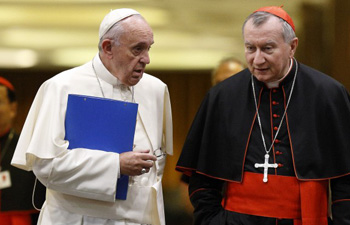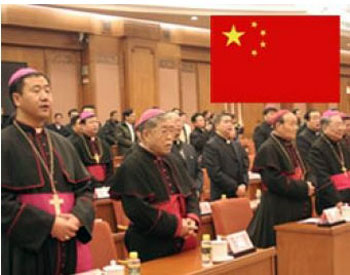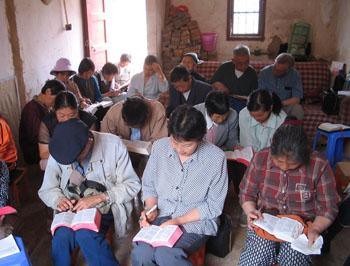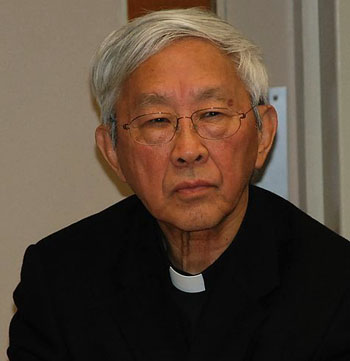Underground Church Resists
A Rome-Beijing Agreement
Benedict's Letter is ambiguous; it can be interpreted in two ways:

Card. Parolin and Francis – supporting the Communist-governed CPA
In this camp is Card. Joseph Zen Ze-Kuin, Bishop Emeritus of Hong Kong, who since his retirement has spoken for the Underground Church in the present battle.
• A progressivist party – backed by Vatican Secretary of State Card. Pietro Parolin – insists that Benedict simply continued the “conciliatory policy” toward the CPA that calls for dialogue to achieve one Church in China. Its adherents hold that the Underground Church must unite with the Communist CPA after a suitable agreement is reached between Beijing and Rome over the selection of Bishops.
With this agreement with the Communist Government, “full communion between the Church in China and the Universal Church” will be achieved and the long desired Rome-Beijing diplomatic relationship with Rome will be established. But, what is the price for such "unity"?
This is the question to be addressed here since the Vatican has stepped up the pace in pursuing the conciliatory policy. The situation has gotten very hot in China with Francis at the helm of the ship, determined to forge a union with China and get an invitation from Beijing for the long-anticipated visit in his Year of Mercy. The reactions are escalating daily both at the Vatican and in China.
A breakthrough on appointment of Bishops
Disregarding the increase in the persecution of the Catholic Church in the Catacombs (here and here), Francis continues to smile and extend an olive branch to communist President Xi Jinping.
Earlier this year, he sent Chinese Lunar New Year's greeting to President Xi, offering effusive praise of the country's rich culture and past. Anyone who has read about the Communist Cultural Revolution that Mao inflicted on the Chinese people in the 1960s knows that the authentically rich Chinese culture was brutally suppressed and replaced by Communism with a vulgar egalitarian lifestyle that included denial of private property, a brutal one-child policy, forced abortion and sterilization.

China's CPA Bishops' Conference is openly controlled by the Communist government (AsiaNews.it photo)
In late January the Vatican held its third round of negotiations with the Chinese delegation in Rome and reports started to circulate of a “breakthrough” on the critical topic of the appointment of Bishops. A fourth “secret” meeting in April reportedly had “successful” results, with a working group formed to study the details of these appointments (Cardinal Kung Foundation Newsletter, August 2016 report).
According to news releases, these are the demands that Beijing put on the table, which the Vatican seems willing to accept:
- The Holy See will give full recognition to all the Patriotic Association bishops, including the eight whom the Vatican had previously condemned;
- The Vatican will officially approve the government's Council of Bishops, which will “democratically elect” new candidates to the episcopacy, excluding underground Catholic Bishops;
- The Holy See will approve the Council's appointment, with only a weak right of veto in “severe” cases. However, if the Vatican's reasons are considered “insufficient,” the government Council of Bishops may proceed anyway with the consecrations of new bishops.

Some underground Catholics are already meeting in public places they rent for study & prayer ...
Many Chinese underground Bishops and priests have been prepared for this capitulation to the Communist CPA. In fact, some dioceses are already making efforts at reconciliation, based on their reading of Benedict's Letter.
But others are resisting any compromise with the CPA and its illegitimate authorities. Now, these Catholics are even more confused, as reports sift though claiming that the communist Church will choose bishops and the illegitimate bishops will be approved by Rome. In effect, if they resist, they become the unrecognized ones, the ones who are not following the Pope and his decrees. The whole situation turns on its head.
Card. Zen changes hats & speaks the truth
This disturbing situation has found a spokesman in Bishop Emeritus of Hong Kong Card. Zen who is speaking forcefully against the Sino-Vatican agreement before it becomes official. It is never late to take a good position. Indeed Zen in the past has praised Benedict's Letter and compromised with the CPA. Now, he is supporting the good side.
In a "Painful Appeal" on his personal blog, Card. Zen addresses the question and calls for resistance on the part of the Underground Church. “Can the Pope sign such an agreement?” he asks.

Cardinal Zen: calls for resistance to the Beijing-Rome agreement that hands over bishops' choice to the CPA
Zen further states: “Signing such an agreement means delivering the authority to appoint bishops into the hands of an atheist government.”
If the agreement is signed, he warns, even with the Pope's approval, China's Catholics should refuse to follow insofar as it goes “against their principle of faith.” It is not possible for the faithful of the Underground Church “to come out and surrender to those who were illegitimate bishops for a long time.”
Zen warned that the faithful Catholics who refuse to compromise and do not accept the Sino-Vatican agreement may find themselves in the conditions experienced by Chinese Catholics in the dark and ferocious years of the Cultural Revolution. Nonetheless, he urges them to resist any merger with the government controlled CPA.
What has been the reaction to date of the Vatican and the Chinese Underground Church to the “resistance” proposed by Cardinal Zen? The next article will answer that question.
